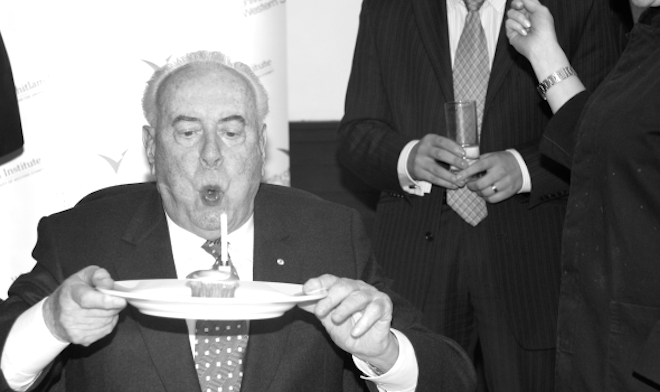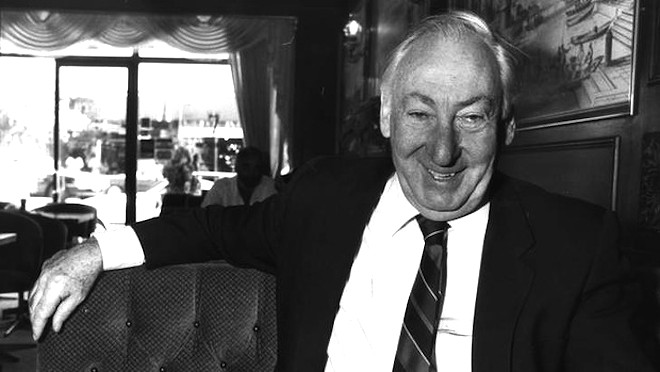The Whitlam era's landmark law reform achievements
 Polly Peck •
Polly Peck •  Thursday, October 23, 2014
Thursday, October 23, 2014 The law and the Whitlam government's reforms ... A welter of changes and improvements ... Dragging Australia into the modern era ... Hostilities aplenty
 Whitlam: massive reform agenda, rapidly implemented
Whitlam: massive reform agenda, rapidly implemented
MANY trees and megabytes have been devoted to the great deeds of the Whitlam government: universal health coverage, free universities, ending Australia's involvement in the Vietnam war, the beginnings of Aboriginal land rights, cutting tariffs, making Jim Spigelman a household name, etc.
However, a large number of the lasting achievements of the Labor government between 1972 and 1975 were in the area of law reform and only scant attention has been paid to them in the current reflections on Whitlam.
The legislative reforms were piloted through a hostile senate by attorney general Lionel Murphy. While they were government sponsored reforms, many of them bore Murphy's hallmark stamp.
The situation was made more curious by the fact that Whitlam and Murphy had little time for each other and on occasions positive loathed one another.
This is a bit different from today, where the current attorney general is deeply embedded in the fundament of the prime minister.
Murphy was as energetic as Whitlam and as keen to get things done, after 23 years of Tory torpor.
Here's a list of the major law reforms of the Whitlam era, in no particular order. It's incredible to think that some of them hadn't happened decades earlier. It also shows that the Abbott government has much work to do to restore Australia to its proper pre-1972 condition:
• Abolition of appeals to the Privy Council;
• Amendments to the National Service Act to abolish military conscription. Dropping prosecutions against conscientious objectors;
• Abolition of imperial honours;
• The notion that there could be duumvirate ministry - the Whitlam-Barnard ministry, on advice from Murphy;
• A competition to choose a new national anthem to replace God Save the Queen;
• A new royal title: Queen of Australia;
• The removal of the royal insignia from post boxes;
• Abolition of capital punishment for Commonwealth crimes;
• The implementation of the system of Senate select and joint committees (although these had been fostered by Murphy from Opposition);
• The establishment of the Australian Legal Aid Office;
• Expanded categories eligible to be marriage celebrants;
 Murphy: piloted momentous economic and social reforms
Murphy: piloted momentous economic and social reforms
• The Family Law Act - one of the most bitterly contested pieces of government legislation, with the churches and even conservative Labor members up in arms about "no fault" divorce and the "ruination of the family";
• The French nuclear testing case before the International Court of Justice at The Hague - this was the first time Australia had brought a case in the ICJ. The outcome was that the French voluntarily halted nuclear testing in the Pacific;
• Reorganisation of the Attorney General's Department, including the creation of an environmental law division;
• Creation of the Australian Law Reform Commission;
• Ratification of the international conventions on the elimination of racial discrimination, civil and political rights and on economic, social and cultural rights;
• The Racial Discrimination Act;
• The Human Rights Bill (lapsed with the double dissolution of 1974);
• Appointment of Ken Jacobs to the High Court;
• Senate representation for the territories;
• The Trade Practices Act - a momentous achievement and the government's first major piece of economic legislation. Its passage was assisted by the joint sitting following the double dissolution. It removed Barwick's lame Restrictive Trade Practices Act from the books, and implemented new law in relation to monopolisation, exclusive dealing, price discrimination, agreements in restraints of trade and anti-competitive mergers, as well as many consumer protection measures;
• Guidelines for foreign investment in Australia;
• Corporations and Securities Industry legislation. This followed the report of the Senate Select Committee on Securities and Exchange. The legislation lapsed as a result of the double dissolution;
• The Petroleum and Minerals Authority (lapsed as a result of the loans affair crisis);
• Restoring Wilfred Burchett's Australian passport;
• An "open government" policy, with the introduction of Freedom of Information legislation and the creation of the Office of Commonwealth Ombudsman;
• Improving extradition arrangements with the UK;
• Creation of the Institute of Criminology and the Criminology Research Council;
• A committee dealing with the computerisation of criminal data;
• The centralisation of territory law enforcement agencies within the department of attorney general and the development of a national law enforcement body (now the AFP);
• Preventing state police from engaging in illegal telephone tapping;
• Insisting that ASIO be accountable to the minister and the parliament.
There must be others to add to the list - suggestions welcome.
For much of our source material acknowledgement must go to Jenny Hocking and her biographies of Gough Whitlam (Vols 1 and 11) and Lionel Murphy.
 Gough Whitlam,
Gough Whitlam,  Law reform,
Law reform,  Lionel Murphy
Lionel Murphy 








Reader Comments